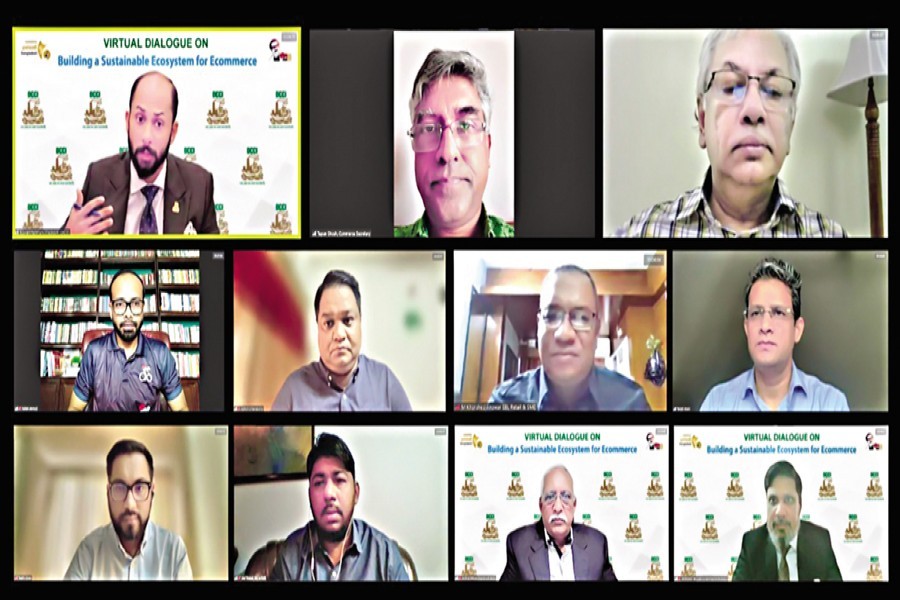Full automation, easy regulations, access to finance, inter-ministerial coordination, easy tax structure and cross-border digital trade are key to fostering e-commerce ecosystem in Bangladesh, speakers said on Saturday.
A huge discount-giving model based on short-term investment may earn a bad name for the burgeoning industry, according to stakeholders.
They underscored the need for timely intervention of the government to stop such unsustainable e-commerce model and make way for a sustainable and customer-friendly digital business.
Industry leaders suggested that the government be cautious about too many regulations which might harm the market's expansion.
The Dhaka Chamber of Commerce and Industry (DCCI) hosted the event styled 'Building a Sustainable Ecosystem for e-Commerce'.
In his opening remarks, DCCI president Rizwan Rahman said e-commerce ecosystem has witnessed a massive vibe in the recent past.
"Although we've seen some challenges facing the sector recently, a sustainable development will come in the sector with the intervention of the government, regulators and stakeholders."
Transactions in the e-commerce sector were about $2.0 billion in 2020, which might increase up to $2.5 billion this year, Mr Rahman said.
Even Facebook-based f-commerce transactions were an estimated Tk 3.20 billion in 2020, he added, citing an estimated data.
Mr Rahman further said that 15-per cent VAT imposed on the sector might hamper the growth of small investors in this sector.
"Moreover, if international market leaders like Amazon come in our market," he says, "it may create opportunity for local CMSME traders and manufacturers."
Commerce secretary Tapan Kanti Ghosh says the private sector is playing a dominant role in the economy.
In e-commerce, reliability is the key issue to help this sector grow, he adds.
Mr Ghosh says the government does not want to impose strong regulations on the sector so that small entrepreneurs can come on board easily.
"Recently, escrow system to see compliance has been introduced but the number of transactions dropped."
The secretary, therefore, recognised the need for a coordinated platform to overview the compliance issue.
He requested consumers not to be greedy or discount-hunters.
Terming e-commerce a dynamic way of business, Mr Ghosh said newer provisions would be added to the policy time to time in order to regulate the sector.
He said the government would review the consumers' protection law in line with the e-commerce regulations.
Barrister KM Tanjib-ul-Alam, head of Tanjib Alam and Associates, underscored the importance of reliability for a sustainable market.
For sustainability, he says, repeat customers are needed. "Depending on only discount hunters and for a few opportunists, the market may be hampered."
The noted lawyer suggested the government frame a policy guideline with scope of reward and punishment.
Pathao president Fahim Ahmed says policy and regulatory guidelines are needed for a sustainable ecosystem.
"Unsuccessful e-commerce platforms with a huge liability and discounting method cannot sustain in the market as it is not economically viable."
Khorshed Anwar, deputy managing director of Eastern Bank Limited, says small e-commerce, startups or f-commerce entrepreneurs are sometimes deprived of access to finance for lack of documentation.
"We're working on the issue and do training programmes for small startups," he mentioned.
Daraz Bangladesh chief operating officer Khondoker Tasfin Alam says excessive discounting model is not sustainable.
"Customer readiness is as important as seller's readiness for a sustainable market," he stated.
Mr Alam says a wrong, sustainable model can become famous for the time being but it will hamper the ecosystem.
Nagad chief information officer Ashish Chakraborty says mobile financial service plays a vital role in e-commerce.
For sustained growth, he emphasised full automation of this sector in order to ensure service delivery information.
Muhammed Abdul Wahed Tomal, general secretary of e-Commerce Association of Bangladesh, says domestic e-commerce has witnessed tremendous growth now which was supposed to come in 2030.
Growth momentum came at a faster rate due to Covid-19, he went on to say.
E-commerce is an integrated sector where agencies like Bangladesh Bank, National Board of Revenue, LGRD, commerce ministry and ICT division are involved.
Regarding escrow service, Mr Tomal suggested making it more automated and easy functioning. All the regulations should come under one umbrella in a combined manner.
He also underscored the importance of data protection to create confidence in the market.
Through this sector, Mr Tomal said, cross-border digital trading would be a billion-dollar industry in future.
Prof AK Enamul Haque of economics department at East West University said the booming e-commerce ecosystem in Bangladesh could be termed revolutionary.
"During Covid time, people could avail the best use of it, but too many regulations might fuel the cost of doing business and discourage investors to come in."
DCCI director Khairul Majid Mahmud, former director Sameer Sattar and former vice-president Riyadh Hossain also spoke.
DCCI senior vice-president NKA Mobin gave a vote of thanks.


